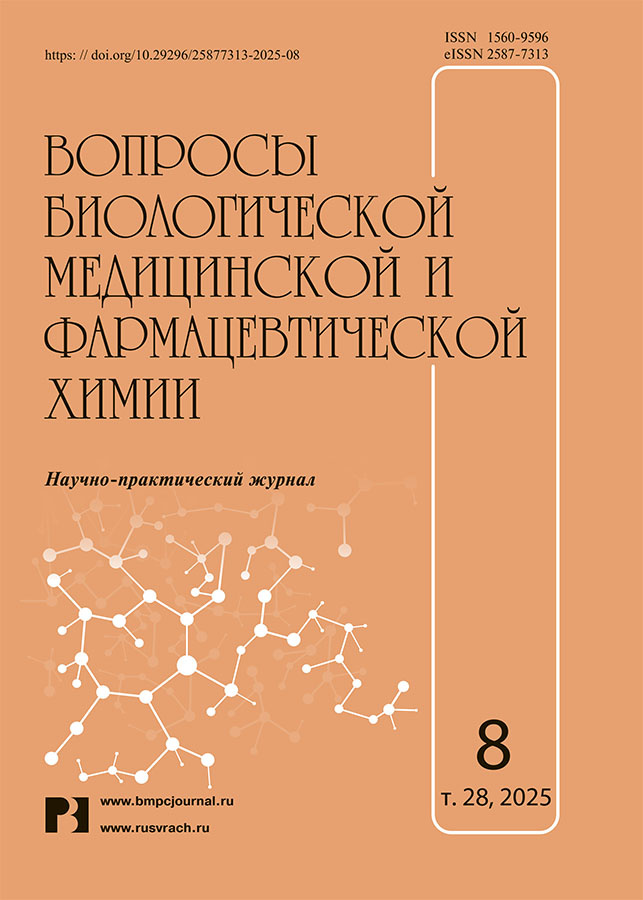Development of technology for obtaining nifedipine nanoparticles to improve its solubility
- Authors: Dahma N.J.1, Zhiljakova E.T.1, Dahma M.J.2
-
Affiliations:
- Belgorod State National Research University
- Pirogov Russian National Research Medical University of the Ministry of Health of the Russian Federation
- Issue: Vol 28, No 8 (2025)
- Pages: 20-26
- Section: Pharmaceutical chemistry
- URL: https://journals.eco-vector.com/1560-9596/article/view/689298
- DOI: https://doi.org/10.29296/25877313-2025-08-03
- ID: 689298
Cite item
Abstract
Introduction. Nifedipine, a typical representative of 1,4-dihydropyridine, is widely used in the treatment of various diseases due to its vasodilatory and antihypertensive effects. Low water solubility is a common problem for drugs such as nifedipine, limiting their bioavailability and effectiveness. This leads to a decrease in the therapeutic effect and the need to increase the dosage, which, in turn, can increase the risk of side effects. Nanotechnology offers a promising approach to overcome this barrier, allowing the creation of dosage forms with improved pharmacokinetic properties.
Aim of the study. Developing a method for increasing the solubility of nifedipine by obtaining nanoparticles using a high-energy ball mill.
Material and methods. The following were used in the work: nifedipine (Tamico, Syria), methanol (Biosolve Chimie, France), potassium dihydrogen phosphate, sodium heptanesulfonate and orthophosphoric acid (85%) (Isolab, Germany), purified water and Tween 20 (Merck, Germany). Nifedipine was ground using a high-energy ball mill (Retsch PM 400). During the research, the dissolution profile of nifedipine and nifedipine nanoparticles was studied by examining their saturated solution using HPLC. To characterize the sizes of the ground samples, they were examined using scanning electron microscopy (SEM).
Results. The use of a high-energy ball mill (Retsch PM 400) allowed us to obtain nifedipine nanoparticles with significantly improved solubility characteristics. It was found that the solubility of nifedipine nanoparticles was 9.05%, which is 38 times higher than that of the original substance (0.24%).
Conclusions. The findings of this study highlight the transformative potential of high-energy ball milling in enhancing the solubility of nifedipine, a crucial component in pharmaceutical formulations. By employing this innovative approach, we successfully produced nifedipine nanoparticles with demonstrably improved solubility compared to the conventional powder form. This achievement opens a new frontier in the development of nifedipine-based dosage forms with enhanced bioavailability. The increased solubility of nifedipine nanoparticles signifies a promising avenue for optimizing drug delivery and potentially improving therapeutic efficacy.
Full Text
About the authors
N. J. Dahma
Belgorod State National Research University
Author for correspondence.
Email: narmeendahma@gmail.com
ORCID iD: 0009-0000-6421-6052
Post-graduate Student, Institute of Pharmacy, Chemistry and Biology
Russian Federation, st. Pobeda, 85, Belgorod, 308015E. T. Zhiljakova
Belgorod State National Research University
Email: narmeendahma@gmail.com
ORCID iD: 0000-0002-8685-1601
SPIN-code: 9169-7991
Professor, Dr.Sc. (Pharm.), Head of the Department of Pharmaceutical Technology
Russian Federation, st. Pobeda, 85, Belgorod, 308015M. J. Dahma
Pirogov Russian National Research Medical University of the Ministry of Health of the Russian Federation
Email: narmeendahma@gmail.com
ORCID iD: 0009-0003-0838-6657
Post-graduate Student, Institute of Dentistry
Russian Federation, st. Ostrovityanova, 1, Moscow, 117513References
- Yifan Liu, Yushan Liang, Jing Yuhong et al. Advances in Nanotechnology for Enhancing the Solubility and Bioavailability of Poorly Soluble Drugs.Drug Design, Development and Therapy.2024; 18: 1469–1495. doi: 10.2147/DDDT.S447496.
- Волкова Е.А., Медведев Ю.В., Фишер Е.Н., Шохин И.Е. Биовейвер как вид исследования биоэквивалентности. Ведомости Научного центра экспертизы средств медицинского применения. Регуляторные исследования и экспертиза лекарственных средств. 2024; 14(1): 42–52. [Volkova E.A., Medvedev Yu.V., Fisher E.N., Shohin I.E. Biowaiver as a Bioequivalence Study Option. Bulletin of the Scientific Centre for Expert Evaluation of Medicinal Products. Regulatory Research and Medicine Evaluation. 2024; 14(1): 42–52. (In Russ.)]. doi: 10.30895/1991-2919-2023-537.
- Suntsova L.P., Shlotgauer A.A., Evseenko V.I. Study of solubility and membrane permeability of mechanochemically obtained solid dispersions of plant flavonoids. Chemistry for Sustainable Development. 2019: 193–199. (In Russ.). doi: 10.15372/KhUR2019125.
- Thibault Massias, Suênia de Paiva Lacerda, Jacqueline Resende de Azevedo et al. Supercritical carbon dioxide solubility measurement and modelling for effective size reduction of nifedipine particles for transdermal application. International Journal of Pharmaceutics . 2023; 630. doi: 10.1016/j.ijpharm.2022.122425.
- Flávia Lidiane Oliveira Da Silva, Maria Betânia De Freitas Marques, Kelly Cristina Kato, Guilherme Carneiro. Nanonization techniques to overcome poor watersolubility with drugs. Expert Opinion on Drug Discovery. 2020; 15(7): 01–12. doi: 10.1080/17460441.2020.1750591.
- Mazayen Z.M., Ghoneim A.M, Elbatanony R.S. et al. Pharmaceutical nanotechnology: from the bench to the market. Future Journal of Pharmaceutical Sciences. 2022; 8: 12. doi: 10.1186/s43094-022-00400-0.
- Dóra Csicsák, Rita Szolláth, Szabina Kádár et al. The Effect of the Particle Size Reduction on the Biorelevant Solubility and Dissolution of Poorly Soluble Drugs with Different Acid-Base Character. Pharmaceutics. 2023; 15(1). doi: 10.3390/pharmaceutics15010278.
- Grebenkin D.Yu., Stanishevskiy Ya.М., Shohin I.Е. i dr. Retrospective of dissolution test of solid dosage forms. 2016; 4(17). (In Russ.).
- Shabatina T.I., Morozov Yu.N., Solovyov A.V. Cryochemical modification of medicinal substances: the effect of the carrier gas flow rate on the physicochemical properties of nanoforms of the antibacterial drug dioxidine. Vestnik Mosk. un-ta. Ser. 2. Ximiya. 2021: 297–305. (In Russ.).
- Aksenova V.V., Kanunnikova O.M., Burnyshev I.N. Decomposition of Toluene During Processing in a Planetary Ball Mill Together with Aluminum and Magnesium Powders. Ximicheskaya fizika i mezoskopiya. 2023: 231–238. doi: 10.15350/17270529.2023.2.21.
Supplementary files











